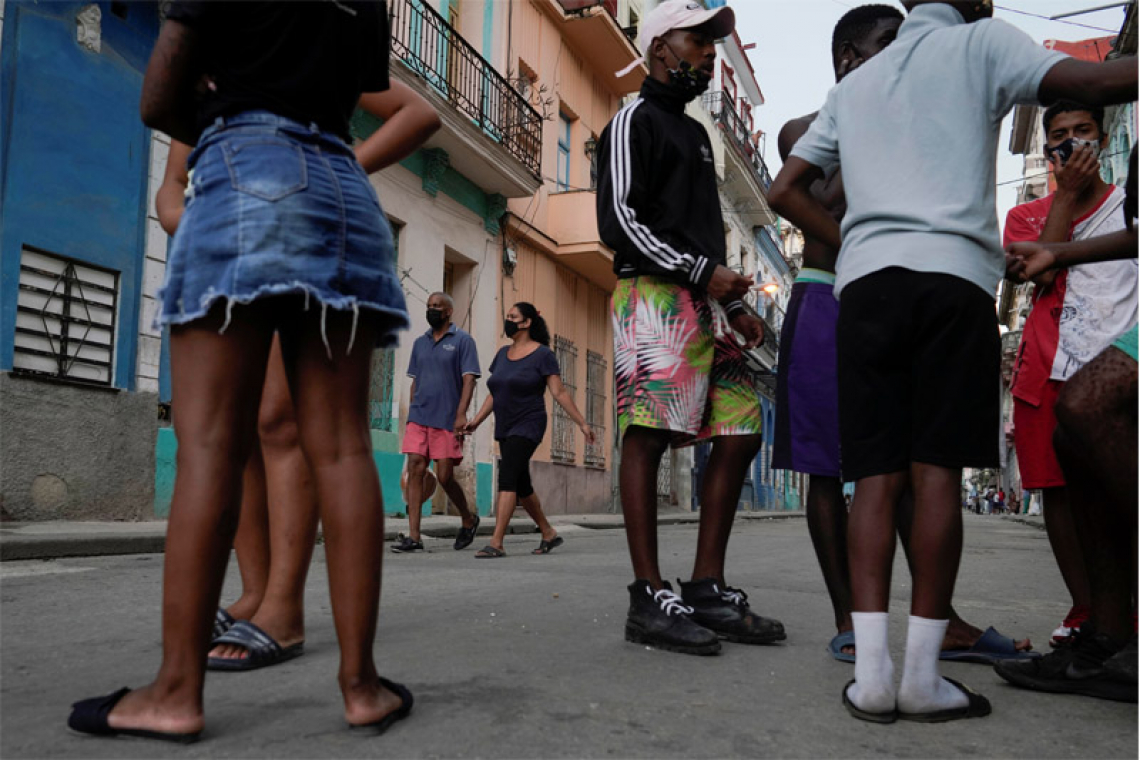People chat on the street in Havana, Cuba, on July 12. Photo credit: Reuters/Alexandre Meneghini.
HAVANA, Cuba--Cuba has restricted access to social media and messaging platforms including Facebook and WhatsApp, global Internet monitoring firm NetBlocks said on Tuesday, amid widespread anti-government protests.
Thousands of Cubans joined demonstrations throughout the Communist-run country on Sunday to protest a deep economic crisis that has seen shortages of basic goods and power outages. They were also protesting the government’s handling of the coronavirus pandemic and curbs on civil liberties.
The protests, rare in a country where public dissent is tightly restricted, largely died down by Sunday evening, as security forces were deployed to the streets and President Miguel Díaz-Canel called on government supporters to go out and fight to defend their revolution.
Still, at least one other protest took place on Monday, in the southern Havana suburb of La Guinera. Hundreds took to the streets, according to two residents and video footage seen by Reuters.
“People kept joining, marching peacefully, shouting slogans like ‘Down with communism,’ ‘Freedom for the people of Cuba,’ ‘We don’t have medicine, we need food,’” said resident Waldo Herrera (49).
Herrera said the protesters started throwing stones at security forces, who eventually responded with gunfire.
One man died and several protesters and security officials were injured, state-run media reported on Tuesday. It did not say what caused the death.
A Reuters witness saw dozens of people carrying sticks departing La Guinera late on Monday.
Activists say the government is using so-called rapid-reaction brigades – government-organised bands of civilian recruits – to counter protesters.
They also accuse the government of trying to disrupt communications. Introduced just over two years ago, mobile Internet has been a key factor behind the protests, giving Cubans more of a platform to express their frustrations and enabling the word to get out quickly when people are on the street.
In the capital, there have been regular and atypical mobile Internet outages since Sunday, according to Reuters witnesses.
NetBlocks, based in London, said on its website that Facebook, WhatsApp, Instagram and Telegraph in Cuba were partially disrupted on Monday and Tuesday.
“The pattern of restrictions observed in Cuba indicate an ongoing crackdown on messaging platforms used to organise and share news of protests in real-time,” said Netblocks director Alp Toker. “At the same time, some connectivity is preserved to maintain a semblance of normality.”
The government did not immediately respond to a request for comment. Neither did Telegram and Facebook Inc, which owns Instagram and WhatsApp. Twitter Inc said it found no blocking of its service.
“Our weapon is the Internet. If they take away the Internet we are unarmed,” said Havana resident Gino Ocumares, as he tried but failed to connect to the Web at a government Wi-Fi hotspot. “The government does not want people to see the truth.”
‘Provocations’
Cuba’s government has said the demonstrations were orchestrated by counter-revolutionaries financed by old Cold War foe the United States, manipulating frustration with an economic crisis largely caused by the decades-old US trade embargo.
State-run media reported on Tuesday that Raúl Castro, who stepped down as head of the ruling Cuban Communist Party in April, attended a meeting on Sunday of the political bureau to address the “provocations”.
Díaz-Canel said in April he would continue to consult Castro on matters of utmost importance.
Counter-rallies of government supporters have been taking place. Around 100 supporters carrying the Cuba flag gathered on a central boulevard in the Vedado business district of Havana on Tuesday.
During or following the biggest wave of protests on Sunday, around 150 people were arrested, according to exiled rights group Cubalex, adding that only 12 had been confirmed released so far.
“In the multiple interrogations, we made it clear that no one was directing us from abroad to take to the streets, that no one paid us a cent to do what we did,” theatre director Yunior Garcia, who was arrested at a protest in Havana on Sunday, wrote on his Facebook page.
He said he was released on Monday, but police officials told him he remained under investigation.
Network monitoring company Kentik said it observed the entire country go offline for less than 30 minutes at around 4:00pm on Sunday, during the peak of protests in Havana. It said on Tuesday it had observed minor outages since then.
US State Department spokesman Ned Price on Tuesday called on the Havana government to open all means of communication, both online and offline.
“Shutting down technology, shutting down information pathways – that does nothing to address the legitimate needs and aspirations of the Cuban people,” Price told a news briefing.
Social media platforms are facing increased demands from governments globally to take down certain content, and in some cases are seeing their services restricted or banned during times of protest.
Last month, Nigeria announced it had indefinitely suspended Twitter in the country, days after the platform removed a post from President Muhammadu Buhari. ~ Reuters ~







